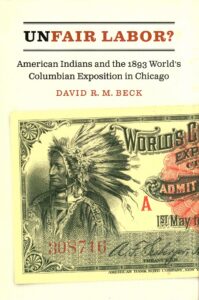Book review: UnFair Labor? American Indians and the 1893 World’s Columbian Exposition in Chicago
Author David Beck’s UnFair Labor? American Indians and the 1893 World’s Columbian Exposition in Chicago is an exploration of Indigenous participation at the 1893 World’s Fair through work. He effectively argues that while the various fair organizers, showmen, and others sought to portray Indigenous peoples as a primitive counter to modern America and Chicago, Indigenous peoples sought to participate for their own ends, specifically to earn money and show spectators that they too were part of the modern world. Beck’s narrative effectively illustrates how Indigenous participants in the 1893 World’s Fair did so by “acting independently in their own self-interest” (xxi).
UnFair Labor divides its eight chapters in three parts. Part One, “Overview: American Indians and Ethnology at the Fair”, provides a contextualization of the fair’s story. This section’s chapters examines how the representation of Indians through the living displays were contested by Indians, anthropologists, entrepreneurs, and government officials, all of whom wanted to portray the ‘authentic’ Indian. Simply, Indians wanted to show themselves and their communities as part of the modern world, while others sought to show Indians as static examples of the pre-Columbia past. Importantly, Beck discusses how Indigenous participation in the fair was part of a larger movement in Indian country to find ways and means to support themselves, families, and communities while maintaining language and culture in the face of colonialism, paternalism, and poverty.
Part Two, “Before the Fair”, explores the collection of Indigenous material culture across the Americas that was to be displayed at the fair. In this section, Beck explores how various groups seeking to acquire Indigenous materials as well as the tourist trade, allowed some Indigenous peoples to charge market rates for cultural materials – either originals or made-to-order pieces. The market rate, however, was tempered by whether or not it was tourist season, proximity to tourist markets, experience with sales to collectors, as well as economic conditions in the communities. Regardless, Beck concludes that the cash infusions made by collectors acted as an additional means of subsistence for individuals and families in communities marginalized by Western societies’ paternalism, land loss, and economic collapse. He also describes how some individuals and communities did manage to control what was sold or recreated based on cultural protocols – much to the annoyance of those collecting for the fair.
Part Three, “During the Fair: Working in Chicago”, is a fascinating study of Indigenous labour at the fair. In this section, Beck explores salaries, working conditions, labour actions for better wages, as well as why some Indigenous people were unable or chose not to participate in the fair. For instance, Beck discusses how Indigenous participants at the fair exercised their agency in determining or altering the term of employment, such as the Inuit who used the courts to secure a significant pay raise (137-47). Overall, Beck concludes that the labour experience varied from “bleak to positive”, but all earned less than their white counterparts (166).
UnFair Labour nicely illustrates Indigenous agency in terms of labour at the 1893 fair as well as the constraints they faced due to prejudice, colonial narratives, and anthropological demands seeking the authentic Indian. In short, Beck states that, “They were in a curious position of many Indian people of their era, being both exploited … and active agents at the same time” (200). Thus, this is a compelling well-researched monograph that deftly illustrates how Indigenous peoples’ participation in the 1893 Chicago World’s Fair was complex, contested, and a means to participate in the modernizing world as a contemporary people, despite the preset narratives created by the white fair organizers and spectators. UnFair Labor is a must-read for anyone wanting a nuanced study of Indigenous participation in the cash economy through cultural production.
David R. M. Beck, UnFair Labor? American Indians and the 1893 World’s Columbia Exposition in Chicago, (Lincoln: University of Nebraska Press, 2019).



